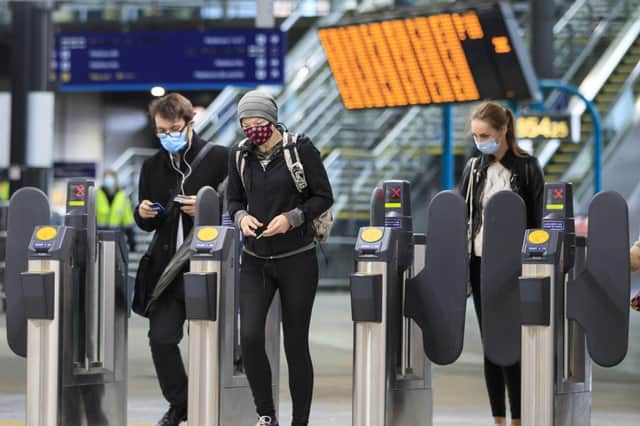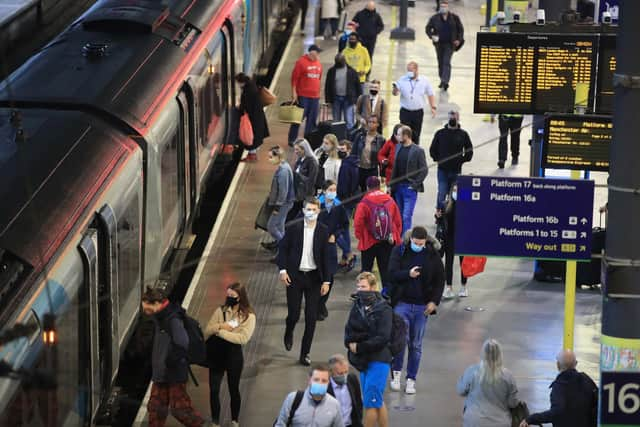Back to bad old days on the rails – David Behrens


It has taken barely any time at all since the restrictions were lifted for services to regress to their depressing, pre-Covid norms of delays, strikes and excuses. Seldom have I seen anything on the railways move so quickly.
To add insult to injury, the industry has pressed ahead with the biggest fares increases since 2013, with some annual season tickets now costing £100 more than before the lockdown.
Advertisement
Hide AdAdvertisement
Hide AdAnd while a few delays are excusable – during last month’s storms, for instance – most are not. TransPennine Express was still bleating this week about crew shortages resulting from the “increasing effect of the Omicron variant”. Consequently, it was operating an “amended timetable”, which is railway-speak for cancelling as many trains as it can get away with. On Monday alone, 48 services failed to turn up, and last weekend, 159 were withdrawn. For those wishing to spend their leisure time visiting loved ones along the Northern Powerhouse corridor, it’s an utter fiasco.


On the nationalised Northern Rail network, the picture is even worse. The company had warned of cancellations last Saturday and Sunday “due to train crew shortages” – and as Weekend Covid is not a known phenomenon, that can’t be the reason – but as late as Tuesday it was withdrawing a frankly staggering 292 services.
This new cancel culture is partly the result of continuing strike action by the RMT union on multiple weekends right through to June, including the Jubilee holiday. TransPennine is nominally the victim of the unrest but in reality the train companies are as guilty as the unions in taking their passengers for a ride – or not, as the case may be. For decades they have been complicit in perpetuating subordinate roles that became redundant when Stephenson’s Rocket was carted off to the scrap yard. It must have been around that time that guards were deemed unnecessary on the London Underground, yet they remain in place everywhere else.
Advertisement
Hide AdAdvertisement
Hide AdThis Wednesday, the incumbents stirred themselves for long enough to hand out leaflets at Leeds Station, warning of the impact of job cuts on services and safety. Passengers would be paying more for less, cautioned Mick Lynch, general secretary of the RMT.
What does he mean, ‘would be’? We have been for years and it’s partly because the industry has too many staff, not too few. People are paid to sit around in cabs, making fatuous announcements on the Tannoy, when they could be deployed to clean the seats or attend to passengers on the platform. The BBC has a comedy called People Just Do Nothing, and its characters are quite industrious compared to the old guard of the RMT.
But the union won’t agree to any significant changes of responsibility because it would put them out of business. Their leverage lies in instructing their members to shut down services, and they can do that only for as long as it’s their finger on the button that closes the train doors and tells the driver to move off. A mirror could do the same thing – as it does on the Tube – but any such technological advance would leave the RMT’s members doing even less than nothing.
Advertisement
Hide AdAdvertisement
Hide AdAnd yet, this is the very shower we somehow expect to deliver the high speed rail service which parts of the country have been promised – the one which 25 years from now will see HS2 bus replacement services operating the length and breadth of the country.
It remains unclear whether the new lines will reach the most populous parts of Yorkshire, but the real scandal is that they are being built at all when so many cheaper and less disruptive high speed options were on the table. This was pointed out to the Department for Transport as early as 2012 by the Commons Public Accounts Committee, yet here we are, a decade later, with a plan even less thought through than it was then.
But while the industry remains hostile to change, passengers are embracing it. For many, the new normality means an end to the ritual of five-day commuting, and the absence of a reliable service to and from home will cause others to join the exodus. By the time HS2 comes along, the guards might outnumber the passengers.
Advertisement
Hide AdAdvertisement
Hide AdSupport The Yorkshire Post and become a subscriber today. Your subscription will help us to continue to bring quality news to the people of Yorkshire. In return, you’ll see fewer ads on site, get free access to our app and receive exclusive members-only offers. Click here to subscribe.
Comment Guidelines
National World encourages reader discussion on our stories. User feedback, insights and back-and-forth exchanges add a rich layer of context to reporting. Please review our Community Guidelines before commenting.